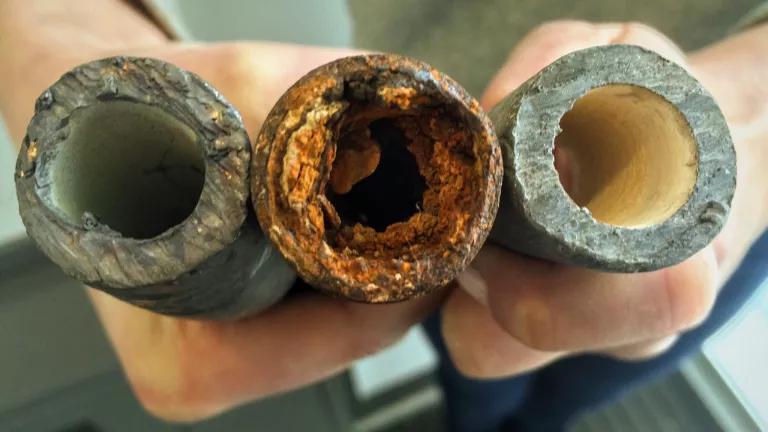IRS: Free Lead Service Line Replacement Is Not Taxable Income
The most common lead pipe replacement programs do not create taxable income for homeowners, which is good news if you don't like drinking through a lead straw.

U.S. EPA Region 5
Tax season got you down? Thanks to a new announcement from the IRS, homeowners, utilities, and state governments involved in the most common lead pipe replacement programs have one less thing to worry about when it comes to their tax obligations: homeowners won’t be taxed by the federal government on free lead water pipe replacements from these programs, and state governments and water systems won’t have to do federal-tax-related information reporting on them either.
The IRS released an announcement describing the two predominant types of lead service line replacement programs—one where the public water system’s workers do the replacement and the other where the water system reimburses the homeowner or pays the homeowner’s contractors directly-- and concludes that, under both programs, the lead service line replacements “do not result in income to the residential property owners.” This statement captures the vast majority of replacement programs funded by the Bipartisan Infrastructure Law, and offers welcome clarity on the taxability of lead service line replacement. This clarity should remove one potential barrier for getting your lead pipe replaced.
This IRS announcement is great news for everyone involved: Homeowners who receive free replacements through one of these programs won’t owe federal taxes. State governments and water systems won’t have to file information returns or furnish tax statements to homeowners.
To reach its conclusion in the announcement, the IRS also recognized that utilities generally control the full system of pipes. This is in contrast to some water utilities that have decided to try to leave homeowners in a lurch and saddle them with responsibility for the part of the pipes that run through private property. On this point, the IRS observed that in the typical replacement programs, “the public water system controls all or virtually all aspects of the replacement work.” This is because utilities generally control virtually all aspects of the water distribution system itself, and always have. In fact, typical homeowners ended up with lead pipes in the first place because lead pipes were often required by plumbing codes just to be eligible for a hookup to the public water system. The degree to which utilities control the terms of any changes to the water pipe distribution system has not changed much in all of that time, so it makes sense that they would be so involved in pipe replacements. It is a welcome step forward to see this reasoning reflected in the IRS announcement.
With this IRS announcement, utilities across the country can move forward with steps to correct this historic problem by removing lead pipes, and they can move forward at no cost to homeowners without concerns about those replacements creating federal tax burdens.
This blog is only a brief summary of the IRS announcement on lead service line replacement and does not seek to provide legal or tax advice. You should speak to your accountant or lawyer to learn more about any federal, state, or local tax consequences of lead service line replacement.
This IRS announcement is great news for everyone involved: Homeowners who receive free replacements through one of these programs won’t owe federal taxes. State governments and water systems won’t have to file information returns or furnish tax statements to homeowners.




